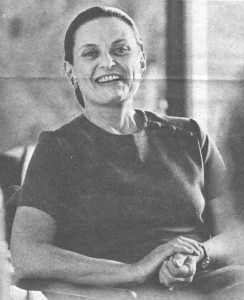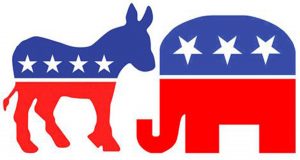Archive for July, 2018
Women’s rights moves into politics
Continuing my exploration of feminism in the 1970s, a profile for my New Zealand newspaper of a woman political candidate.
Women in Politics Part II
Women’s rights moves into politics
Cupertino, CA, October 1972
Rhoda Freier is a new phenomenon in American politics. She is an avowed feminist who has carried the banner of the women’s movement out of the rap sessions and the action groups, and into the male-dominated arena of party politics. As the Democratic Party candidate for the 22nd California Assembly District, her platform is environmental protection and zero population growth.
Until seven years ago Rhoda Freier’s life reflected the malaise of many an American housewife whose children are gone off to school, leaving her with time on her hands. Then the Freiers moved to California. Suddenly all her latent dissatisfactions burst into full bloom. “California does that to people,” she says. Maybe it’s something in the air!”She went back to college to continue her studies in biology and to upgrade her teaching qualification. Her biology studies led her next to Zero Population Growth. Environmental and population concerns began to coalesce into women’s problems.
National Organization for Women (NOW) was the culmination of all these interests and the one which has commanded her strongest loyalties. She became president of the South San Francisco Bay chapter two years ago. As the mainstream of the women’s movement moved toward politics as the only effective method of achieving equality for women, it pushed her along with it.
Diffident and unwilling at first, she surprised herself by winning the three-way race for the Democratic nomination for 22nd District with a handsome 50 percent of the votes. The general election next month is going to be a more difficult proposition. “No matter how strongly you feel about an issue, you have to know how to go about it, and I really didn’t.” Her neophyte campaign organization functions on “a crisis to crisis basis.” Like most candidates, she directs the emphasis herself, with help from consultants within the Democratic Party. It is a strongly woman-centered effort, drawing heavily from NOW and ZPG. Her financial director is a busy young woman with a pre-school family and a part-time job as a children’s librarian, who has still found time to organize events like the jumbo-sized garage sale which netted a whopping $600 for the campaign coffers.
But by no means is it a female chauvinist affair. Ms Freier’s husband is her campaign manager. Paul Ehrlich, author of The Population Bomb, has taken time to speak on her behalf. Promises of help in the crucial pre-election work have come from prominent and experienced male members of the local Democratic Party.
Lack of funds is a chronic problem. Democrats, lacking the big business resources of the Republican Party, have traditionally relied heavily on union support. This in Ms Freier’s case has been conspicuously lacking, partly through her own inexperience, and partly through union opposition to the women’s Equal Rights Amendment, which she supports.
The attitude of the local press, who consistently refer to her as “the Women’s Lib candidate,” has also been an obstacle. “I have no qualms about being identified as a feminist. But the term ‘lib’ or ‘libber’ is used in a denigrating way that is very damaging and insulting.”
She doesn’t feel that being a woman is all that much of a handicap. But neither is it a conspicuous asset. A survey by the National Women’s Political Caucus showed that, of thirty new women candidates in the June primary election, only twelve are still in the race, and only two of these, including Rhoda Freier, won contested primaries.
“It’s hard to know what the factors were: unwillingness to vote for a woman; inexperience on the part of the woman running; lack of money? We’ll never know. But I’m certainly not doing what I did initially, which was to point out that we haven’t even reached the level of tokenism in the number of women in the legislature. Some people may be concerned about this, but the vast majority clearly aren’t.” Nowadays I tackle the positive aspects of my candidacy rather than the fact that I am a woman. I have tried to promote myself as a candidate who is more knowledgeable than most of the other legislators in environmental matters and in the need for population stabilization.”
But she does feel that her candidacy will have an impact on the image of women. “The fact of a woman coming forward as a women’s candidate opens new avenues of thought to a whole lot of people.”
POSTSCRIPT: Rhoda Freier lost the election to the Republican incumbent Assemblyman Richard Hayden, but went on to help establish a Bay Area chapter of the nonpartisan National Women’s Political Caucus.
Political women in the 1970s
In early 1972 I had a note from the women’s editor of my New Zealand newspaper requesting pieces on how the women’s liberation movement had changed the role of women in politics. “Surely,” she said, “women over there do more than make tea for the candidates.” My response was a two-part series. First, the attitudes and roles of party workers in my county, now more widely known at Silicon Valley. In my next post, I’ll share a profile of a woman political candidate.
Women in Politics Part I:
Party workers reflect range of attitudes
Santa Clara County, CA, 1972
The grey-haired woman in the Republican campaign trailer sniffed contemptuously. “Women’s lib! I don’t hold with all that stuff.” She is the wife of a retired army officer, and a veteran of political campaigns. Meanwhile, the Republican incumbent for her Assembly district is being challenged by a feminist woman Democrat, and in Southern California the Women’s Division of the Democratic Party is seeking to abolish itself, on the grounds that a separate women’s organization is sexist in conception.
These are the extremes in the spectrum of views on women’s place in the world that the political party workers of Santa Clara County, CA reflect in their organization, their activities, and their attitudes.
Organization at the state level is set for both parties by the state code. Each legislator or party candidate has up to five nominees to the State Central Committee of his party, of whom at least two must be women. From this 1,000-strong body, a man and a woman for each Congressional District are chosen to form the decision-making executive committee.
“The women have a great deal of influence,” says Loretta Riddle, field representative and campaign coordinator for State Senator A. Alquist, who has served on the executive committee for ten years. “It has been a very fair thing. If you have the ability, and work hard, you can make your voice heard.”
The presence of a few women is customary, though not mandatory, on the elected County Central Committees. But at this level the loose structure imposed by the state gives way to local idiosyncrasies. The Democratic Party, though overwhelmingly the majority part of the county, admits to being fragmented and disorganized. The Republicans, on the other hand, pride themselves on their efficiently centralized hierarchy. Robert Walker, executive director of the Republican county headquarters, has the county committee divided into specialized sub-committees, and keeps close liaison with his party’s many volunteer clubs.
In contrast to the 600 members that the Women’s Division of the Democratic Party can muster, the thirteen chapters of Republican Women’s Club in the county have a total of 3,000 members. Ten of the clubs run their own local campaign headquarters, registering voters and handing out literature for all the Republican candidates. They are also the labor force of the campaign. “Those women are fantastic,” says Mr. Walker. “I can send them a 30,000-piece mailing and get it back the next day all ready to go.”
The Democratic women have a project too: they run the county headquarters for the party. Madge Overhouse, its director, feels that she has a strong voice in the running of the party organization. “But it is simply by going ahead and doing something like this. Within the Democratic Party you can come up with an idea and follow it through.”
“Individual effort” is an idea often expressed by Democratic women; “femininity” comes more often to the lips of Republicans. The northern chapter of the Democratic Women’s Division, though less militantly feminist than its counterpart in Southern California, puts most of its fund-raising effort into the campaigns of women candidates. Ladies’ club activities like luncheons or fashion shows, favorites of the Republican women, are not popular with Democrats. “We are more issue-oriented,” says Madge Overhouse.
The advantage of clubs, thinks Robert Walker, is that they attract people who would not ordinarily be involved with the party. He described the Republican Party as “the party of the middle class. They tend to be socially oriented, and this carries over to their approach to doing political work. They want to gain some prestige out of it.”
Joan Menagh was a founder of the Republican Women’s Club in her neighborhood. While enjoying the social aspects, she stresses that education is its primary purpose. “Volunteerism” has been a popular topic for speakers. Traditional social values prevail. Though she has worked up to a seat on the County Central Committee, and a full-time job in the office of U.S. Congressman Ch. Gubser, Mrs Menagh claims to have no political ambitions. “In my life my husband and family come before any of my other activities.”
Democrat Madge Overhouse is also critical of the more militant factions of her party. “We have to recognize that there are a good many women who are perfectly happy to be wives and mothers. The militants are cutting these women off, and I think it’s too bad.”
Nor for that matter will Loretta Riddle run for office, partly because she wants to stay close to her two teenagers, but mainly because her personality is satisfied with the considerable power she already wields behind the scenes. She does however admire women who have aspirations to high office, and is longing to see a woman in the California Senate. “I don’t think men realize how much they need women in politics. Women have a certain sensitivity and perspective that men do not.”
Both Republicans and Democrats see a trend toward more women in public office. “I think it goes back to this whole women’s lib thing,” says Republican Joan Menagh. “Women for many years didn’t feel that running for public office was a particularly feminine thing to do, and voters in the past didn’t feel that a woman could hold her own within the political arena as a candidate. Both ideas are passing.”
Democrat Loretta Riddle agrees. “People have not yet learned to accept women who are forceful. But that doesn’t mean they shouldn’t go ahead, because then we may go along and start learning little by little.”
The way is open for a woman to rise as high in politics as her ability, tenacity and sheer personal drive will allow. It is a difficult path though, and few are willing to take it. The vast majority of women in political campaigns will no doubt continue to stuff envelopes, sit at voter registration booths, check precinct lists, and make tea for the parched throats of campaign speakers.

